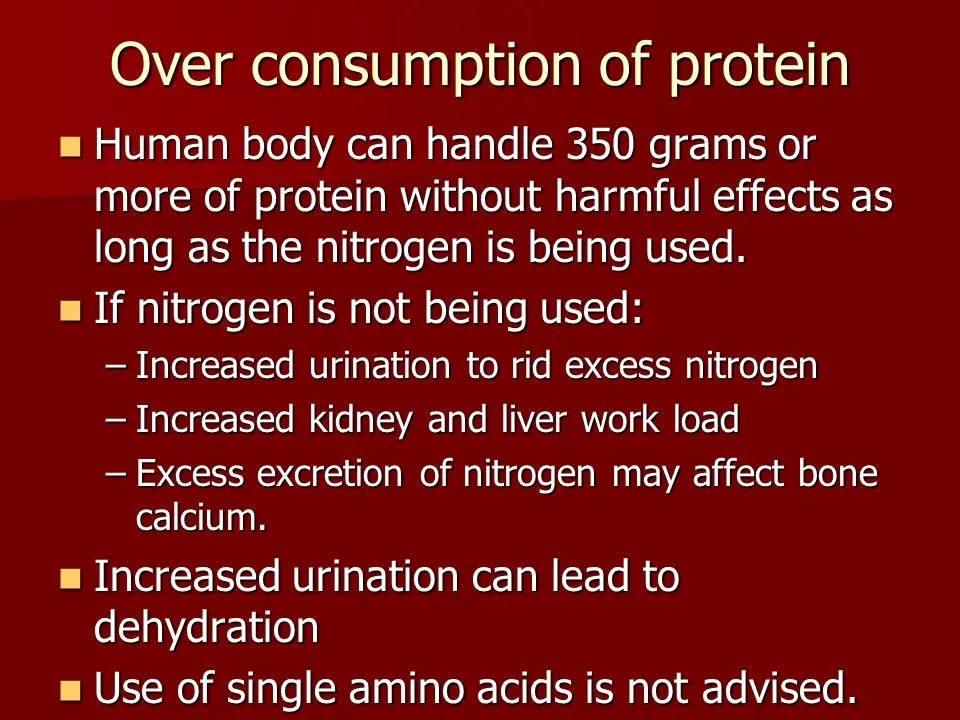Protein is an essential macronutrient that plays a crucial role in the growth, repair, and maintenance of tissues in the body. It is found in a wide variety of foods, including meat, poultry, fish, dairy products, legumes, and nuts. While adequate protein intake is necessary for overall health, overconsumption of proteins can have both short-term and long-term effects on the body.
This article aims to explore the potential consequences of excessive protein intake and shed light on the considerations surrounding protein consumption of proteins
Understanding Protein Intake Recommendations
Before delving into the effects of overconsumption, it is important to understand the recommended daily protein intake. The Recommended Dietary Allowance (RDA) for protein varies depending on age, gender and activity level. The RDA for adults is approximately 0.8 grams of protein per kilogram of body weight per day. However, individual protein requirements may differ based on factors such as physical activity, pregnancy, and specific health conditions.

Effects of Overconsumption of Proteins
- Increased Stress on the Kidneys due to overconsumption of proteins
When protein is consumed in excess, the body must process and eliminate the surplus nitrogen waste products generated during protein metabolism. The kidneys play a vital role in filtering and excreting these waste products. Over time, a high protein intake can put a strain on the kidneys, potentially leading to kidney dysfunction and an increased risk of kidney stones or kidney disease, particularly in individuals with pre-existing kidney conditions. - Risk of Nutritional Imbalances:
Excessive protein intake can displace other essential nutrients in the diet. A diet heavily focused on protein may lead to inadequate consumption of important carbohydrates, dietary fiber, vitamins, and minerals found in other food groups. This can result in nutrient imbalances and deficiencies, potentially compromising overall health and well-being. - Increased Risk of Bone Loss:
Some studies suggest that a high intake of animal-based proteins, particularly when accompanied by low calcium intake, can increase the risk of bone loss and osteoporosis. High protein diets may lead to increased urinary calcium excretion, potentially contributing to reduced bone mineral density. It is important to maintain a balanced diet with adequate calcium intake to mitigate this risk. - Digestive Issues due to overconsumption of proteins
Consuming excessive amounts of protein can lead to digestive problems such as constipation, bloating, and discomfort. This is particularly true when protein intake is accompanied by inadequate fiber intake. Fiber is essential for maintaining healthy digestion and preventing constipation. Balancing protein intake with an adequate amount of dietary fiber can help alleviate digestive issues. - Increased Risk of Chronic Diseases due to overconsumption of proteins
Some studies suggest that a diet high in animal-based proteins, particularly red and processed meats, may increase the risk of certain chronic diseases. Excessive consumption of red and processed meats has been associated with an increased risk of cardiovascular diseases, type 2 diabetes, and certain types of cancer. It is important to choose lean protein sources and incorporate a variety of plant-based proteins into the diet to mitigate these risks. - Weight Gain due to overconsumption of proteins
While protein can contribute to feelings of satiety and help with weight management when consumed in moderation, overconsumption of proteins can lead to weight gain. Protein contains calories, and consuming large quantities of protein-dense foods can result in a calorie surplus. This excess energy can contribute to weight gain if not balanced with appropriate physical activity and overall caloric intake.

Considerations for Protein Consumption
- Individual Needs and Goals:
Protein requirements vary based on age, gender, body composition, activity level, and overall health goals. It is essential to determine individual protein needs based on these factors rather than following a one-size-fits-all approach. Consulting with a healthcare professional or registered dietitian can help determine the appropriate protein intake for specific circumstances. - Balanced and Varied Diet:
Maintaining a balanced diet that includes a variety of nutrient-dense foods is crucial for overall health. While protein is important, it should be complemented with adequate amounts of carbohydrates, healthy fats, fruits, vegetables, and fiber-rich foods to ensure a well-rounded diet. - Focus on Quality Protein Sources:
Choosing high-quality protein sources is essential for optimal nutrition. Opt for lean meats, poultry, fish, legumes, nuts, seeds, and dairy products that are low in saturated fats and rich in essential nutrients. Incorporating plant-based proteins into the diet is also beneficial for reducing the environmental impact of food production. - Moderation and Portion Control:
Adhering to moderate portion sizes and spreading protein intake throughout the day can help prevent over-consumption. Distributing protein intake across meals and snacks allows for efficient utilization by the body and minimizes the strain on the kidneys.

Proteins are vital for maintaining proper bodily functions, but overconsumption can have negative implications on health. Understanding individual protein requirements, maintaining a balanced diet, and choosing quality protein sources are key factors to consider. By being mindful of protein intake and adopting a well-rounded approach to nutrition, individuals can promote overall health and mitigate the potential risks associated with overconsumption of proteins.


























